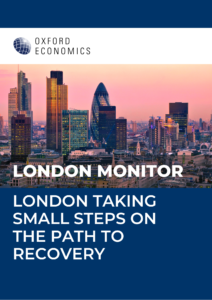UK | London Monitor: London taking small steps on the path to recovery

Our Oxford Economics Normality Tracker improved in March, reflecting a fall in Covid cases, thanks to the January lockdown.
This has occurred at a time when other European cities have been experiencing rising case numbers.
Download this report to learn more about:
- The UK economy fell by less than expected in January, and another
fiscal stimulus was announced in the Budget. - The Oxford Economics Normality Tracker comparing London with other European cities
- London business conditions improved in February.
- The latest labour market data from the ONS indicate a 38,000 fall in resident employment in London.
The analysis and forecasts in this report are part of the Oxford Economics Cities and Regions suite of forecasting services, which now covers 7,000 cities and regions across the world, providing regularly updated data, forecasts and analysis for each location. Forecasts are produced in conjunction with the Oxford Economics Global Economic Model (GEM). This ensures that developments in the global economy have a direct influence on the outlook for city and regional economies.
Tags:
Related Services

Post
Global enterprise tech spend pushed by secular, pulled by cyclical
Global spending on technology products by businesses and governments will grow 5.8% in 2025, adjusted for inflation and currency movement, which is over twice the pace of GDP, according to Oxford Economics’ latest forecasts. Adding the impact of prices and currencies, global enterprise tech spend will increase 7.6%, exceeding $6.5.
Find Out More
Post
After the presidential debate, the US election remains a toss-up
Though Vice President Kamala Harris' chances of winning the election have improved since her debate with former President Donald Trump, we aren't changing our subjective odds for the outcome of the 2024 presidential contest.
Find Out More